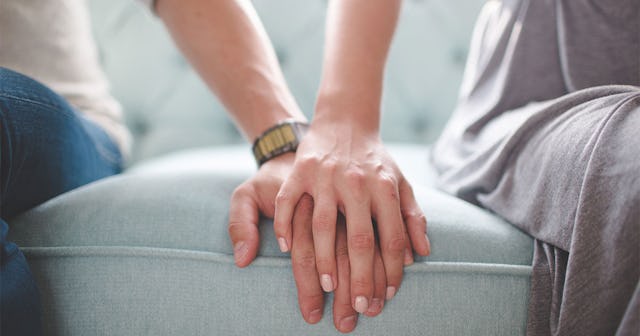I'm A Queer Woman And I'm Married To A Man

To say my husband and I have lived a fairy tale life — and had a fairy tale relationship — would be an understatement. I met Jason in the fall of 1996, when he was 11 and I was 12. We spoke regularly and often: about cartoons, the Yankees, music, and Stephen King. We sat together in art class, and he always made me laugh in science class. Mainly about the teacher or our peers. And when the Halloween dance came around that October, I asked him to go with me. We swayed slowly to songs about (grownup) love.
We began dating in 2001, at the beginning of our senior year. We moved in together in 2003. We both attended college in Philadelphia and thought sharing an apartment would be ideal. There were no RAs, roommates, or rules. We could — more or less — do whatever we wanted, whenever we wanted. We wed in the fall of 2007.
We welcomed two children, in 2013 and 2019.
And while our relationship has always been warm and comfortable — we formed a friendship first, and that has been the foundation of our bond, our connection and our love — things changed in my 30s. I changed in my 30s, and by my 36th birthday I realized I didn’t love him, not the way I used to.
I wanted to be with women.
I needed to be with women.
Of course, our vows didn’t prepare me for this moment. When we stood before our friends and family and said we would be together “for better, for worse, ’til death do us part,” I meant it. I believed we would grow old together — and always be together. So when these thoughts began to creep into my mind, I ignored them. I silenced my wants. I ignored my sexual desires, and I rationalized my feelings. This — I thought — must be “for worse.” This is what my pastor tried to warn me about.
But the more I tried to ignore these thoughts, the more they consumed me. I became angry and apathetic, downtrodden and depressed. I became frustrated, by sex and with myself, and I spent many nights alone, crying myself to sleep. But still I pushed on. In silence. Ashamed. This, I decided, was my lot. This was my life. Plus, I had (and still have) a loving husband and two children, and while my house lacks a white picket fence, I have the perfect life. So I wasn’t a lesbian. I couldn’t be a lesbian. In March, I told my husband I was bisexual — days before COVID-19 permanently altered our lives.
He asked what that meant, for him and for us, and I said nothing. I told him it meant I was attracted to women but it wouldn’t impact our relationship, and he supported me, wholly and completely. He began sending me graphic images of women and stories of erotic couplings (aka lesbian porn). But the word felt icky. My newfound identity was off-putting. Something, I knew, was still wrong, because I wasn’t bisexual.
That was a cop-out.
That was a lie.
I was a woman who really loved women. Today, I identify as queer. But that knowledge doesn’t make me feel any better. It still doesn’t make me feel any better, and it doesn’t make things any easier. I still live very much “in the closet,” i.e. I present as a heterosexual woman, living a “normal” heterosexual life. I am still married and unsure how to proceed. I do not want to lose my children or my best friend, but in the process I am losing myself. Every single day, I lose myself. The shame continues. I feel lost and completely alone. And I am angry at myself, because my husband is hurting because of me.
I feel I have to choose: his happiness (and the happiness of my family) or mine. And that is the worst feeling in the world.
The walls of our 1,400 square foot home are closing in.
You can cut the proverbial tension with a butter knife.
The good news — if there is good news — is that I have an amazing therapist and psychiatrist. I have a few very supportive friends, friends who have been where I am. Who know exactly how I feel. And that is comforting. When I want to run and give up, on myself and life, they don’t let me. They remind me I’m here and queer and that’s okay. As for my marriage, I don’t know what the future holds. We are navigating new waters, without a compass or a guide.
I’d be lying if I said I was okay. I’m scared; more scared than I have ever been. But we will keep going. We will keep talking, even when the words are hard to say (and even when they are harder to hear). And we will figure this out together. Because I married my soulmate. My best friend. And while my sexual desires have changed, my husband remains that person. He is my children’s father, my first love and forever friend.
This article was originally published on